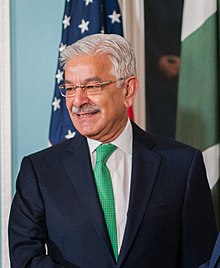US Suspending Aid to Pakistan Benefits China and Russia

Featured image: Khawaja Muhammad Asif (Source: Wikimedia Commons)
VISIT MY NEW WEB SITE:
Contact at [email protected].
US geopolitics is unacceptably hostile. On Thursday, the State Department “placed Pakistan on a Special Watch List for severe violations of religious freedom.”
A nation at war with Islam at home and abroad outrageously accused the country of religious violations – instead of taking steps to clean up its own vile agenda.
Separately on Thursday, the State Department said Washington is suspending at least $900 million in US military aid to Pakistan, accusing its government of failing to address sanctuaries in the country, allegedly used to attack Afghanistan.
Pakistan’s Dawn broadsheet said Washington suspended all aid to the country, calling US policy a “condition and issue-based approach,” adding:
Aid will only be sent for specific strategic purposes, State Department spokeswoman Heather Hauert, saying the suspension remains in force until Islamabad “takes decisive action” against elements “destabilizing the region and targeting US personnel.”
The only destabilizing element is America’s presence, its endless war of aggression on Afghanistan, its enormous cross-border harm to Pakistan, its ruthlessness jeopardizing world security.
On Wednesday, Pakistan’s Foreign Minister Khawaja Asif blasted Washington, saying “history teaches us not to blindly trust the US,” adding:
The Pentagon “carried out 57,800 attacks on Afghanistan from our bases. Your forces were supplied arms and explosives through our soil. Thousands of our civilians and soldiers became victims of the war initiated by you.”
The cost of his country’s alliance with America’s “war on terror” has been devastating for the country.
Asif hinted at a foreign policy shift toward China and Russia, saying
“China lives next to us and we have a common wall. Russia can also be our good friend.”
Islamabad must correct and improve its geopolitical relations, he stressed. His country suffers enormously from US aggression in Afghanistan.
“There is no end in sight,” Asif said. “We are looking for peace and harmonization in the region” – unattainable with America’s hostile presence.
Days earlier, China’s Foreign Ministry spokesman Geng Shuang defended Pakistan, saying:
The country “has made great efforts and sacrifices for combating terrorism and made prominent contributions to the cause of international counterterrorism, and the international community should fully recognize this,” adding:
“We welcome Pakistan and other countries’ cooperation on counter-terrorism and in other fields on the basis of mutual respect and their joint commitment to the security and stability of the region and the world.”
“China and Pakistan have maintained the all-weather strategic cooperative partnership. China stands ready to further deepen cooperation with Pakistan in various fields to bring greater benefits to the two peoples.”
Islamabad appears willing and eager to strengthen bilateral ties. On January 2, the State Bank of Pakistan said it adopted the Chinese yuan as a currency for trade and investment, the bank saying:
“Both public and private sector enterprises (in Pakistan) are free to choose (the yuan) for bilateral trade & investment activities,” adding:
“Considering the recent local and global economic developments, particularly with the growing size of trade and investment with China under CPEC (the China–Pakistan Economic Corridor), yuan denominated trade with China will increase significantly, going forward; and will yield long term benefits for both the countries.”
Both countries agreed to multi-billion dollar deals under Beijing’s Belt and Road initiative.
Trump administration hostility toward Pakistan pushes the country closer to China and Russia.
*
Stephen Lendman is a Research Associate of the CRG, Correspondent of Global Research based in Chicago.
VISIT MY NEW WEB SITE: stephenlendman.org (Home – Stephen Lendman). Contact at [email protected].
My newest book as editor and contributor is titled “Flashpoint in Ukraine: How the US Drive for Hegemony Risks WW III.”

